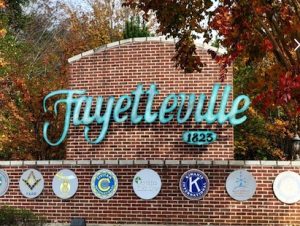The Fayetteville City Council on July 16 adopted the FY 2021 General Fund budget totaling $16.966 million, a decrease of $620,706 in revenues from the current $17.587 million.
City Manager Ray Gibson during the presentation said in preparing the budget staff was “very cautious due to the unknowns with Covid-19 and the future of the economy.”
The vote to adopt the budget was 5-0.
Gibson noted that staff were able to account for the $620,706 decrease in revenue without dipping into reserves.
Local taxes, and specifically sales taxes, account for the largest drop in revenues, with the city expecting to receive $13.826 million during the coming fiscal year compared to $14.168 million this year, and representing a decrease of $342,343.
Sales taxes were budgeted at $3.9 million in 2020, and at 3.793 million for 2021, a decrease of $106,434, or 2.73 percent.
Similarly, property taxes for 2020 were budgeted at $4.534 million, with those revenues for 2021 expected to be $4.432 million, a decrease of $102,421, or 2.26 percent.
Pertaining to local taxes, property taxes account for 59 percent of revenues, or $10.033 million, while local option sales taxes account for 22 percent of revenues, or $3.794 million.
Among the adjustments being made, City Manager Ray Gibson said no jobs are planned to be cut, though a number of vacant positions will be frozen for the time being.
The biggest hit came to Public Works, which saw a $454,097 decrease due to cutting professional services and freezing two positions.
Among other reductions was a cut in judicial contract services of $23,627, defunding a vacant building inspector in Community Development for a savings of $72,395 and engineering cuts of $75,000.
“If the economy picks up, we can see about unfreezing the positions if needed,” Gibson said.
The city is also cutting the additional $37,000 it allocated to the Fayette County Development Authority beginning last year. Gibson said the new budget calls continuing to help fund FCDA at $67,000.
A breakdown of General Fund expenditures shows public safety, which is always the case with local government, accounting for the largest slice of the pie.
Police services accounts for 34 percent of the budget, with fire services at 27 percent, and with all other categories at 1 to 6 percent of the budget.













Leave a Comment
You must be logged in to post a comment.